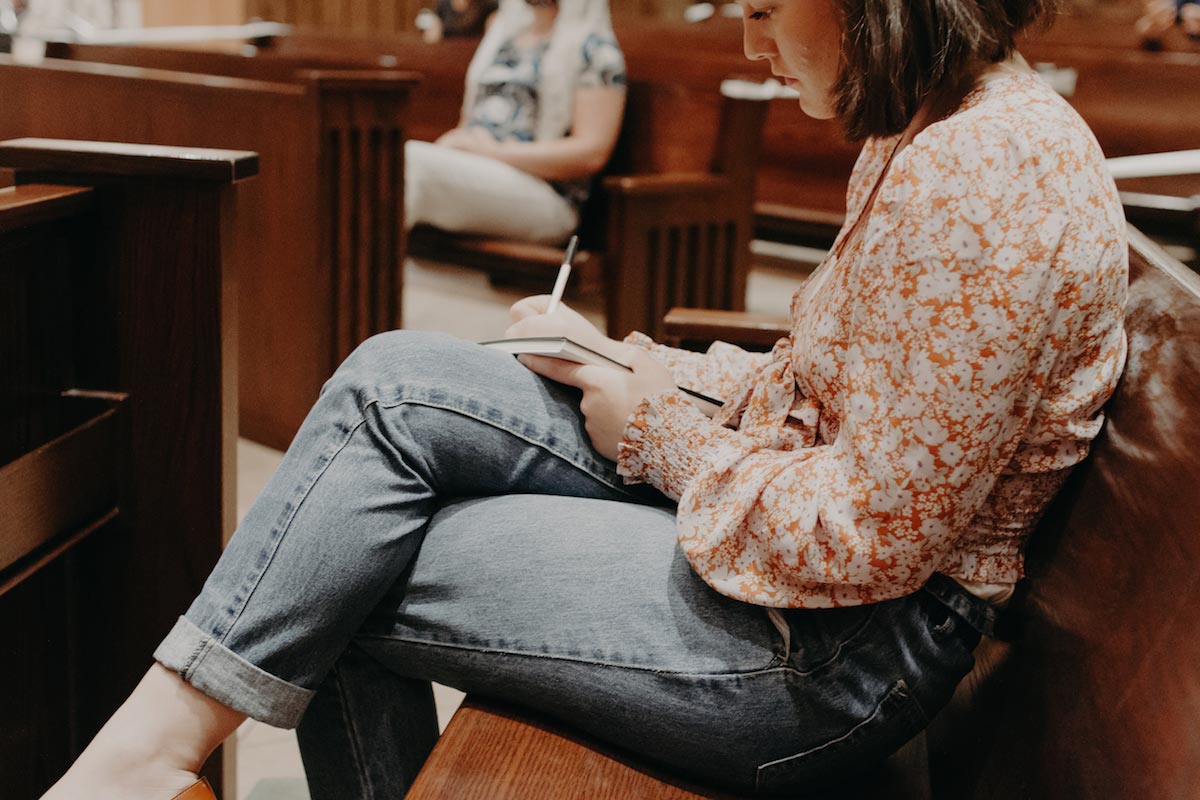
Over the course of a career, teachers are tasked with the important job of helping thousands of individuals develop their God-given gifts with which they will (hopefully) better society and build up the Kingdom of God. It should come as no surprise then, that the job itself is far from easy. Long school holiday breaks do not always make up for the constant physical, mental, and emotional energy demanded by the profession.
Litany of Saints for Teachers
Divine grace is truly needed, which is why we compiled a Litany of Saints for Teachers. While it’s certainly true there are numerous Saints whose patronage would be of benefit to educators (Saint Drogo as the patron Saint of coffee, for example), the Saints in this litany are all men and women who know firsthand the cross that accompanies the profession and were able to persevere in virtue and grace.
Saint Cassian of Imola
An Italian bishop and teacher in the 4th century, it was discovered Cassian was a Christian when he refused to pay homage to Roman gods. Condemned to death, the Romans invited his students to be the ones to carry out the deed. Relishing the opportunity for revenge for all the times their teacher had punished them in class, Cassian’s pupils tied him to a stake and stabbed him with iron styli (the writing utensils they used for their school work).
Clearly Cassian was familiar with teaching students who disliked him, so we can ask for his intercession with difficult students in our own classrooms.
Blessed Leonella Sgorbati
An Italian woman of the twenty-first century, Leonella was a religious sister who spent 30 years serving the poor in Kenya and Somalia. A nurse herself, Leonella instructed local men and women in the profession, eventually starting and running a school of Nursing with the help of her religious order. Leonella empowered her students to better their own lives and serve their community. She was sadly killed by an Islamic extremist in 2006 and was declared a martyr of the Church.
May we all learn to share our personal passions with our students that they can be formed to improve the community around them.
Saint Agatha Lin
Agatha was a 19th century Chinese woman who devoted her whole life to evangelizing in a country where it was highly illegal. Born to Christian parents, Agatha actually received her schooling from consecrated virgins. She studied hard, eventually becoming a teacher (and consecrated virgin) herself.
Initially she was an instructor at the house of formation for the consecrated virgins, but through prayer and discernment, left her home and moved to a village in the Langdai district that was inhabited heavily by the Miao people (an ethnic minority). Her main focus was the informal education of women, but she couldn’t help but introduce the richness of the Faith as well. Within two year, all of Agatha’s students converted. Eventually her teaching efforts caught the attention of the government and she was beheaded.
We may never face the physical threats she faced in teaching, but we can ask her to intercede on our behalf when we are being threatened by other outside forces (such as upset students and their parents).
Saint Albert the Great
A Dominican friar who lived during the 13th century, Albert was one of those “once in a lifetime” kind of teachers who had a major impact on all the pupils he taught. He developed strong relationships with each of his students, encouraging them to look at issues from multiple angles in order that they would become masters of all that they studied. Albert’s most famous student was Thomas Aquinas; Albert’s method of approach towards issues can be seen in his student’s writings, in particular the Summa Theologica.
Albert knew well the strengths and weaknesses of each student. When Aquinas’ classmates referred to him as a “dumb ox” because he was large and spoke slowly, Albert retorted, "We call this man a dumb ox, but his bellowing in doctrine will one day resound throughout the world."
Albert is proof of the incredible impact a good teacher can have on generations, and we ask through his intercession for the grace to do the same.
Saint Francis de Sales
While the majority of the Saints in this litany are noted for their work in educating the underprivileged, Saint Francis de Sales focused his effort in one-on-one instruction with “the elite,” souls that he recognized had particular aptitude for spirituality. Francis did so not because he thought these people to be more important than others, but rather he recognized their gifts were meant to help the whole Church and these souls often had no idea how to develop them.
What I found to be most interesting is that the majority of these “elite”souls who received his instruction were women (at a time when Europe was anti-feminist), and Francis received a lot of flack for this. Still, on his own time (as he was not a formal teacher but a bishop) he provided instruction, encouragement, and education according to the personal needs of each soul, a sentiment that may be shared by personal tutors and homeschooling parents!
May we all recognize those souls we encounter with this elite potential and help them to develop their gifts for the benefit of the world!
Saint John Cantius
It’s no wonder that Saint John Cantius is the patron Saint of teachers and students. Extremely well-learned himself, he was a teacher and Department Director at Jagiellonian University in Krakow, Poland in the 15th century. He cared deeply for his students, assisting in their spiritual, academic, and personal needs. John’s approach towards teaching is apparent in his own words, “Fight all error, but do it with good humor, patience, kindness, and love. Harshness will damage your own soul and spoil the best cause.”
We ask for his ability to love and correct our students the way in which he did!
Saint Aloysius Gonzaga
Saint Aloysius Gonzaga died of a plague at the age of twenty-three because he bravely ministered to the sick. Though he was never an official teacher, he was so wise that he taught catechism classes to others when he was just eleven years old. Sometimes as teachers, we have students who are smarter than us, or older than us and those nerves can creep their way in.
May Saint Aloysius serve as a reminder of our abilities when we encounter moments of fear and doubt about our abilities in the classroom.
Saint Joseph Calasanz
Saint Joseph Calasanz was a priest with advanced degrees in theology and law, but he walked away from those careers because he was deeply stirred by the need of the poor for proper education. Upon receiving permission and finances to open a school, an influx of excited students was immediate. The school size needed to be increased soon after opening their door, more men were drawn to the mission as teachers, and they became recognized as an official religious order, the Piarists, by the Church. Joseph was named their superior and proved himself to be incredibly virtuous in the face of adversity.
As the order grew, so did the difference of opinions. Joseph was demoted because of his friendship and support of Galileo (and because he sent students to study under the astronomer), but he handled the entire situation with grace and humility. His name was not cleared until eight years after his death. Saint Joseph Calasanz is a great comrade to call upon when we find our efforts being criticized by others.
I think it’s also important to note that the work of his order continued. Some of the most famous people to have benefitted from the free education offered include Wolfgang Mozart, Francisco Goya, Franz Schubert, Gregor Mendel, and Victor Hugo. Imagine how different the world would be if not for Saint Joseph Calasanz’s obedience to the prompting of the Holy Spirit.
Saint John Baptiste de la Salle
Saint John Baptiste de la Salle is often referred to as the Father of our Modern Education. It was he who implemented the division of students by age into classes, as well as trade schools, high schools, and formal training for those who desired to teach as a profession. He truly believed, “You can work miracles by touching the hearts of those entrusted to your care.”
May Saint John Baptist de la Salle assist us all in touching hearts, working miracles, and developing better systems to educate future generations.
Saint Kuriakose Elias Chavara
An Indian priest and social reformer in the 19th century, Saint Kuriakose Elias Chavara stooped below his social status to make sure that the “untouchables” received the education they deserved. He even broke the law to ensure they learned sanskrit.
In addition, he knew that his students would get more out of their schooling if they received a midday meal to sustain them, a “luxury” many poor families could not afford. He instigated a program where other students donated bites from their own plates every day; they discovered there was more than enough to feed everyone when they did this. The program was so successful Kuriakose took the idea to the king and it was implemented in all government schools.
May the intercession of Saint Kuriakose Elais Chavara encourage us to serve the lowest of our community while also empowering our students to take care of one another.
Saint John Bosco
An Italian priest who created a school for boys because he saw too many of them who lived on the street end up in jail, Saint John Bosco created a lasting legacy in the field of education. He not only gave these boys a home and an education, he set up apprenticeships with local tradesmen so the boys would be successful when they outgrew the school. Furthermore, he provided each boy in his school with personal guidance (much like Saint Francis de Sales, which is why Bosco named his religious order the Salesians).
The love and care the boys received had a lasting effect; many returned to join the order and teach at the school and others became virtuous, contributing members of society.
Two of my favorite quotes from St. John Bosco are advice he passed on to his fellow teachers in regards to dealing with difficult students: “Get them to love you and they’ll follow you anywhere” and “It’s not enough to love them, they have to know they’re loved.”
May St. John Bosco help us all to help our students know that they are loved.

WRITE + PRAY
We invite you to sit with the Word and unpack it in a uniquely personal way, finding your own story.
Discover your story within His.
Saint John Henry Newman
A convert from the Angelican faith, Bishop Barron describes Saint John Henry Newman as a pivotal player in the field of theology and the eyes of the Catholic Church. Yet the Saint himself proclaimed, “Education has always been my line.”
He worked as a tutor, a teacher, and also an administrator, establishing Catholic universities of the same caliber as other great English institutions. He called for an educated Catholic laity—and didn’t shy away from teaching secular subject matter like evolution and darwinism. He believed the laity needed to be educated in these matters so to be able to live out their Faith in the fullness of truth.
May St. John Henry Newman assist us all in preparing our students to live virtuous lives in a secular world.
Saint Miguel Febres Cordero
An Ecuadorian religious brother who belonged to the order established by Saint John Baptiste de la Salle, Saint Miguel Febres Cordero was a teacher for over 32 years. As is often the case when it comes to teaching, textbooks were bad or non-existent, so Miguel authored his own. His textbooks were published in the areas of Spanish, Literature, Linguistics, and Teaching Methods (just to name a few). They were of such high quality that the government adopted them for use in all public schools.
May Saint Miguel Febres Cordero, by his intercession, assists us all in the creation of quality materials for all students.
Blessed Jutta of Disibodenberg
Blessed Jutta of Disibodenberg left a wealthy, noble family to become a hermitess and live a quiet life following God. She was revered for her spiritual wisdom and she taught local girls in order to make a living. Her most famous pupil was Saint Hildegard of Bingen—one of only four women to be declared a Doctor of the Church.
May Blessed Jutta assist us in instructing our students so well that they surpass us in knowledge and skill.
Saint Angela Merici
Saint Angela Merici founded the Ursline Sisters who dedicated themselves to educating young girls during a time period when the education of women was under attack (a result of the Renaissance and Enlightenment).They succeeded in their endeavor and the order continues to run schools for girls to this day.
May Saint Angela Merici assist us in moving against the waves of society’s popular opinion!
Saint Elizabeth Ann Seton
Saint Elizabeth Ann Seton shares an experience to which many of the teachers reading this blog can relate: she was a working mother. She had five children, and when widowed, started the first American Catholic parish school to support her family. Her efforts at the school lead to the founding of a religious order, the Sisters of Charity, as well as the establishment of the first American Catholic orphanage.
May Saint Elizabeth Ann Seton help us to lovingly fulfill all the unique responsibilities of the vocation God gives to each one of us—especially when they are a-typical!
Saint Mary Helen MacKillop
The first and only Australian saint, Saint Mary Helen MacKillop founded her first school to help support her family. When this was successful, she was joined by many other women teachers, and under the direction of a priest, they established the first Catholic school in the country.
This success led to the creation of a new religious order, the Sisters of Saint Joseph of the Sacred Heart, as well as the explosion of over 40 Catholic schools across the continent. Shockingly, due to a disgruntled priest who had the ear of the bishop, Mary was excommunicated when she objected to changes the men wanted to make in regards to the order’s religious constitution. Mary showed great virtue through the turmoil, and the bishop himself restored her to full communion on his deathbed.
May Saint Mary MacKillop intercede for us when we are misunderstood and under scrutiny by our bosses!
Saint Frances Xavier Cabrini
Saint Frances Xavier Cabrini was an Italian religious sister with a desire to be a missionary in China. However, her bishop saw a need elsewhere: in New York City where the vast population of Italian immigrants were facing loads of injustice. “Not to the East, but to the West,” he told her, and Saint Frances Xavier Cabrini obeyed.
She immigrated herself, faced incredible adversity, but stopped at nothing to accomplish her mission. In addition to her many, many works, she and her sisters established schools in all over the country, as well as in Europe and South America, educating the poorest of society in an attempt to help them rise above their difficulties.
May we all be as resilient and persevering as Mother Cabrini when assigned duties that are the opposite of what we want!
Saint Katharine Drexel
A wealthy socialite and heiress, Saint Katharine Drexel had a heart for philanthropy that was instilled by her parents. Upon their deaths, she used her entire inheritance to establish schools for Black and Native American children who were unable to attend “regular” school because the law did not permit it. Under the guidance of the pope, she also founded a religious order to work in those schools and served as their superior.
Additionally, Katharine financed the printing of a Navajo-English Catechism, and founded Xavier University in New Orleans, the first Catholic University in the United States for Black people. By the time of her death, she had financed over 100 schools across 16 states.
May we all learn to be as generous in giving of ourselves to our students as Saint Katharine Drexel was!
Blessed Contardo Ferrini
The son of a teacher who then went on to become one himself, his life of virtue and instruction lead to Blessed Contardo Ferrini to be dubbed the patron Blessed of universities. Incredibly well-learned and considered an expert in many fields, as well as speaking several languages, Contardo discerned that his vocation was as a lay single-person. His life was lived in total service to others.
Let’s Join Them
There’s an old saying: “Those who can’t do, teach.”
These holy men and women certainly prove the inaccuracy of that sentiment. Teachers are often those people who were brilliant and the best in their fields but entered education specifically to help others. The holy men and women in this litany share many of the same qualities and characteristics that we see within teachers today. Sacrificing better jobs and cushier lives, these Saints dedicated their lives to ensuring the development of other people, often even using their own money to do so.
This sounds like the majority of the teachers I know.
This year, when the going gets tough, we invite you to return to this litany, praying it over and over again in the hopes that it will result in waves of grace cleansing your classroom! Maybe, with their help, we’ll find our own names added to a new litany of Saints!
Print your copy of the free graphic here and keep it tucked in the pages of your academic planner!

LITURGICAL PLANNERS
Our Liturgical Planners are based on the Litany of Humility. Enter into prayer every day alongside this beautiful Litany.
Order your days in His peace.































